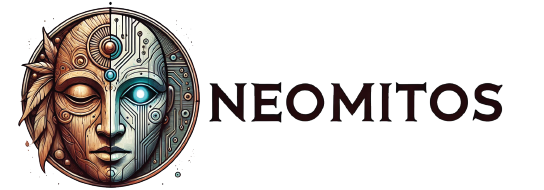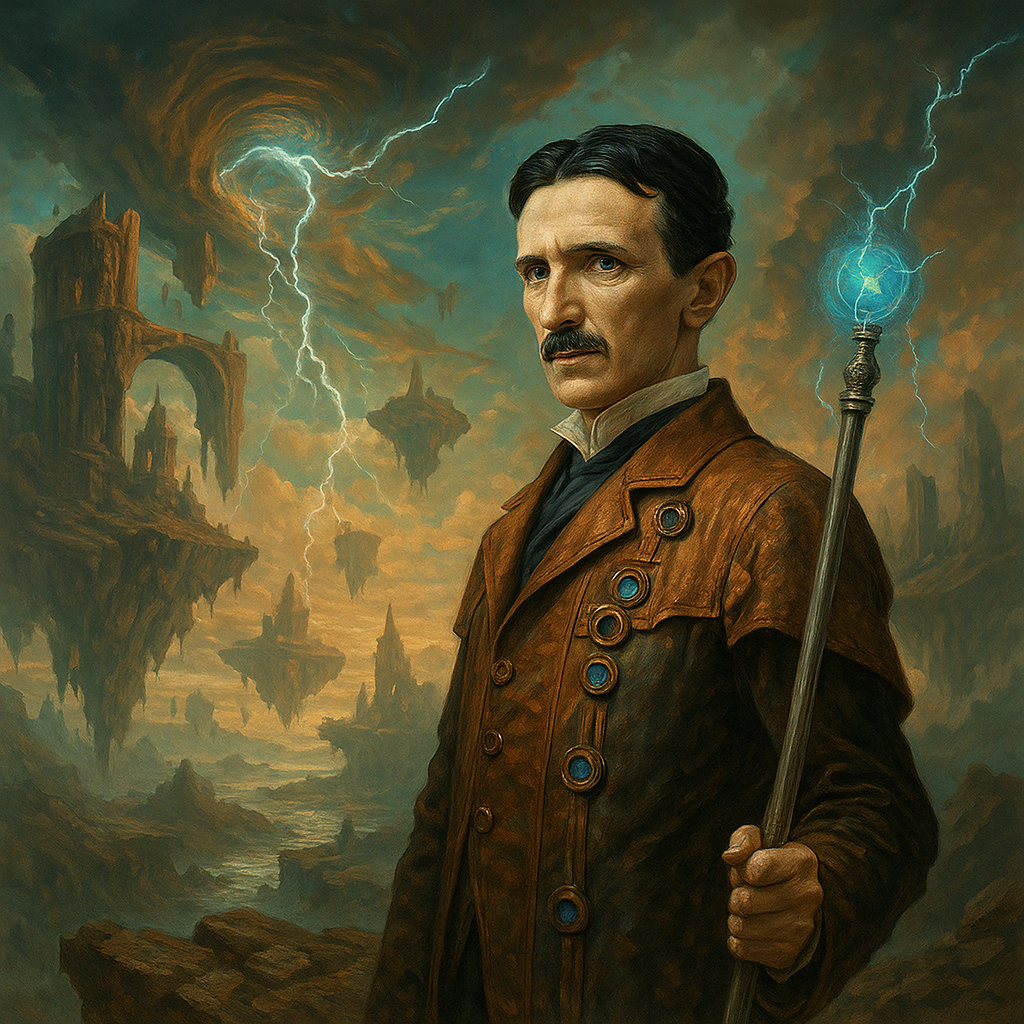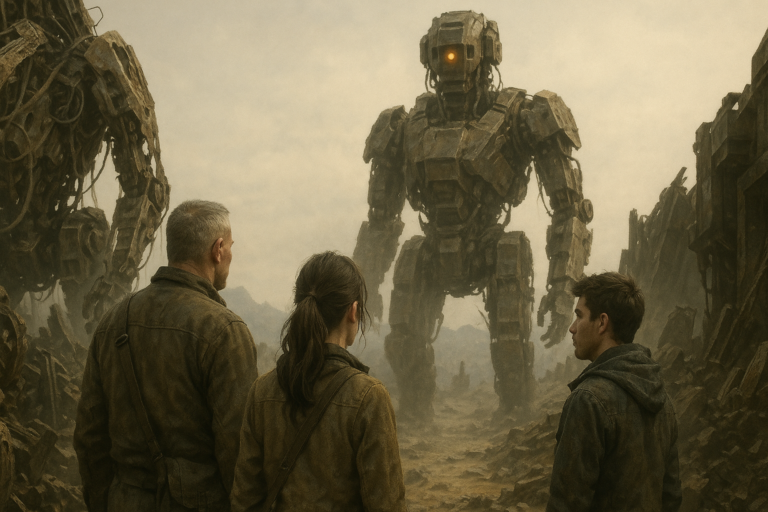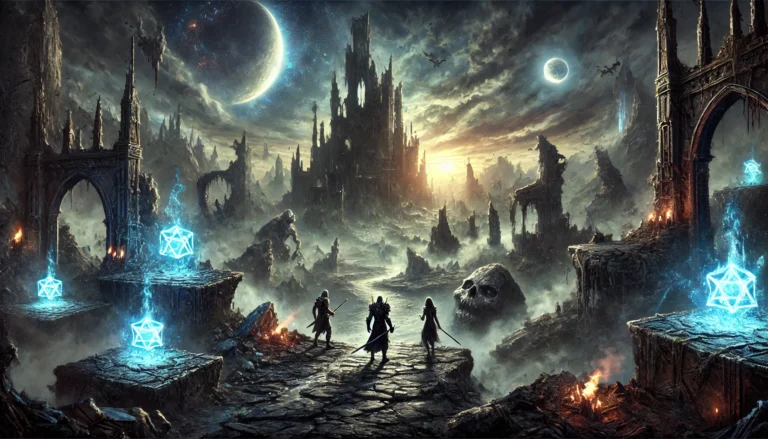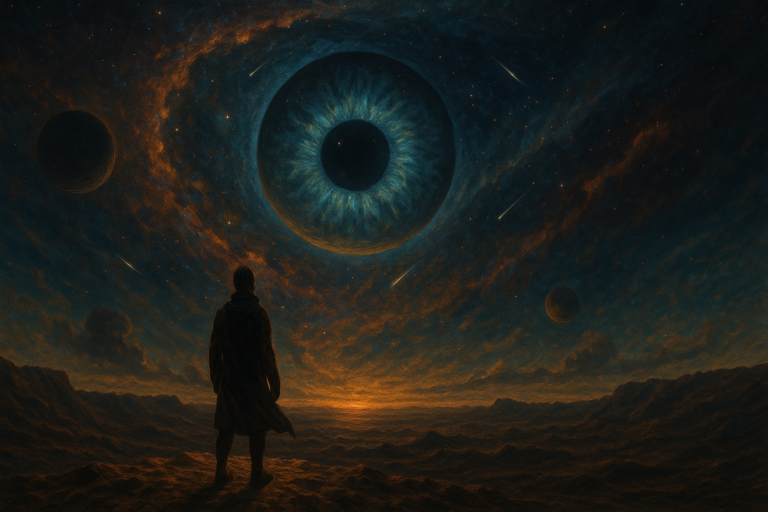The Lightning of Ubraeth
Part 1: The Flash and the Wound
The air on the floating isle of Kherador smelled of ozone and astral sage. The night sky was a fractured tapestry, where stars pulsed between seams of poorly stitched reality. The storm was about to be born. And Tesla, suspended above the rotating platform of the Unbound Word, awaited its touch like one waits for an absent god.
Lightning danced around the living hull of his ship, feeding its copper-organic cells. The resonance wings, vast as sails on a celestial galleon, spun like mechanical mandalas. Tesla adjusted the dial on his antenna-staff, and a melody of harmonic screeches flowed from the metal, summoning a signal.
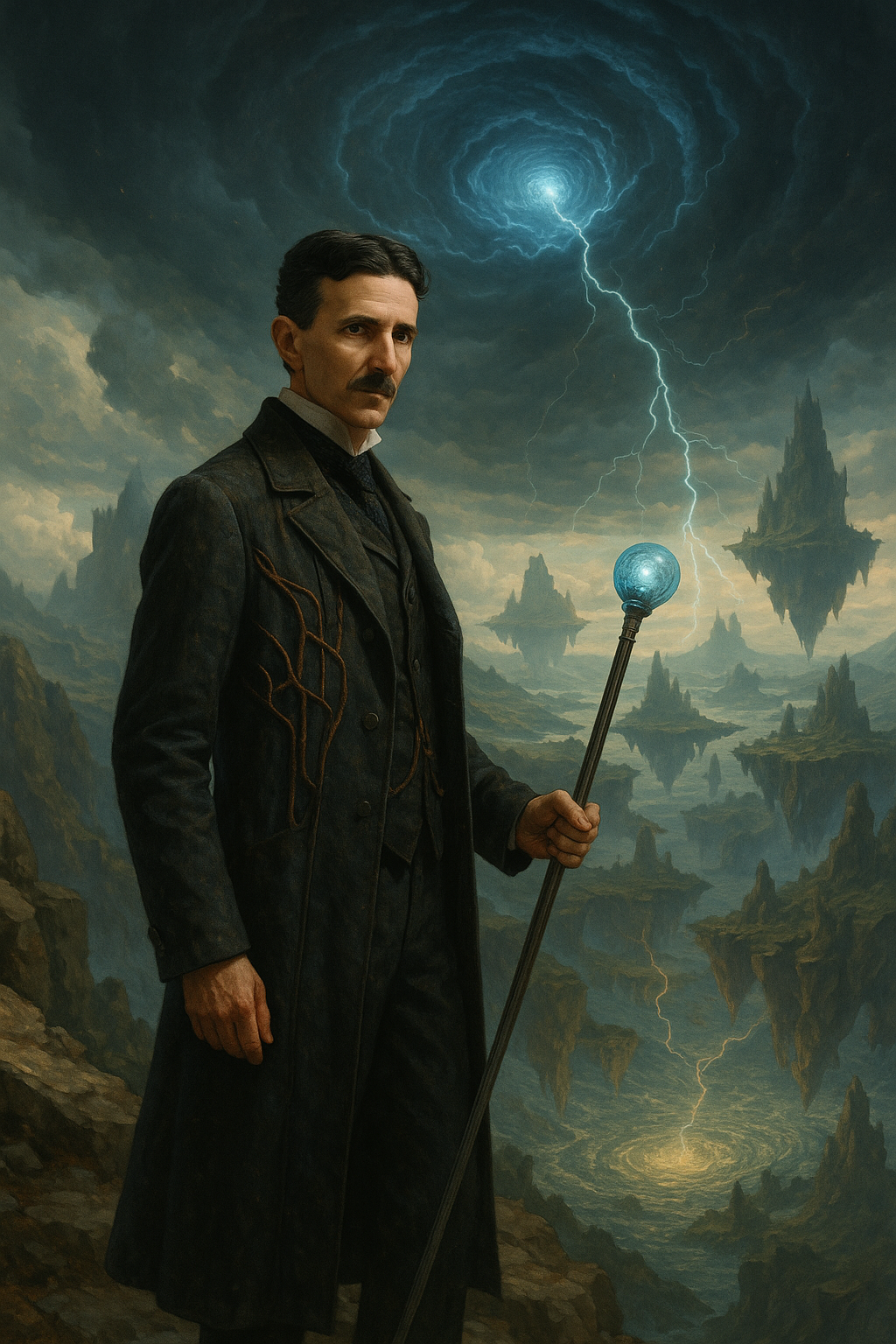
—Open, my abyss… answer me, —he whispered.
The reply wasn’t immediate, but it came. A deep murmur, like a thousand voices speaking from within a fleshless throat. Tesla trembled. Not with fear, but recognition.
Aeonflux stirred on the horizon. The energy lines twisted as if something—someone—was pushing the limits of the world from within. In the eye of that future storm, he perceived a version of himself, different, treacherous, perfect.
Then the ship groaned.
Not from physical damage, but from ontological pain. Something—someone—was trying to sever the anchor that kept it bound to this dimension. Tesla ran to the central console, a mix of baroque organ and archaic telecommunications device.
On the liquid screen appeared a face. Floating. Androgynous. Luminous. A creature of impossible geometry: Uzu-Tal.
—Ohhh, incarnate lightning, child of the storm and lost code, —it sang in multiple voices—, Today a path splits. Will you cross it, or deny it, Nikola of a thousand minds?
Tesla raised an eyebrow, his gaze charged with impatience.
—Speak clearly or be silent. I’m close to completing the Threshold Equation. I won’t lose more cycles to your parables.
Uzu-Tal smiled. Or something similar.
—Then hear this: the isle of Kherador will be devoured. Within its core sleeps the Fragment you seek. But there also awaits Delyth Rho… with sword and judgment.
Tesla paled. His former master. The bearer of judgment.
—Then I must go, now.
—Oh, yes. But remember… —and its floating eyes multiplied like bubbles— lightning doesn’t choose where it falls. Only what burns when it touches down.
And the connection cut.
Tesla stood in silence. A decision split his soul: to seek the Fragment on the isle—and face the weight of the past—or wait, and continue harvesting energy without provoking a storm that could rupture cosmic balance.
But he was never born for waiting.
He turned his staff, plunged it into the navigation core, and the Unbound Word roared like a heart newly freed. Kherador’s coordinates burned into the resonance sails. And like a fallen angel from the inverse heavens, the ship descended toward the inevitable.
Part 2: Kherador, Isle of Echoes
The isle of Kherador floated over a spinning abyss, held by a single root of living obsidian pulsing with every beat of Aeonflux. It was a land of singing ruins, where buildings eroded by time and energy whispered their memories in continuous murmurs. The wind was language. The stones spoke.
When the Unbound Word descended, the sky turned an unreal shade of blue, as if the atmosphere had forgotten its true color. The ship landed on a circular platform carved with ancient spirals, remnants of a civilization that once tried to name the abyss—and was consumed by it.
Tesla disembarked alone. His footsteps echoed in multiple layers, as if each one was printed in more than one dimension.
And then he saw her.
Seraphyne Vael, standing atop a bridge of suspended energy. Her living armor vibrated gently, as if torn between protecting her or disintegrating by the presence of the one she once loved and feared. The strange light turned her into a mythic figure: a warrior tempered by loss.
—Nikola —she said gravely—. I told you not to return for the Fragment.
—And I told you the Fragment cannot be ignored —he replied—. The abyss already speaks. If we don’t listen, it will scream.
—Delyth is here —she added, averting her eyes—. He brought the Oath of the Center. He believes you’re about to disrupt the Balance… again.
Tesla walked toward her. Each step a poem of metal and will.
—And you, Seraphyne? Whom do you fear more: Delyth, or what we could create?
She hesitated. And that doubt spoke louder than any answer.
A thunderous rumble broke the tension. From Kherador’s crater, a column of light rose into the sky. The carved codices began to glow. The Fragment was awakening.
And with it, the past.
A portal opened like a flower of shadow, and from it emerged Delyth Rho.
He did not walk. He moved as if physical laws served him exclusively. Around him, reality slowed, as if each moment required his approval to exist.
—Nikola Tesla —he said flatly—. The Schism was your fault. I won’t allow another.
Tesla raised his staff like a scepter of lightning.
—Then come, master. Teach me once more why knowledge must fear change.
Aeonflux roared in the skies. The ruins trembled. And the island began to fracture.
Part 3: The Laws That Bleed
The first strike wasn’t physical. It was a collision of wills: a clash between two opposing visions of reality. Tesla, as incarnate lightning, activated the Resonance Mode of his staff. The engravings along its shaft lit with runes that responded to creative thought. Each gesture summoned fleeting structures: circles, patterns, energy towers blooming and vanishing like dreams.
Delyth Rho, by contrast, imposed stillness. Around him, time quivered. Probabilities aligned to favor him. His right arm, an ontological prosthesis, morphed into a black lance that devoured light. He didn’t launch attacks—he needed them, and the universe obeyed.
The battle was asymmetric. Each time Tesla tried to alter the environment, Delyth corrected it with a blink, as if erasing an error from a cosmic equation. But Tesla, anticipating this resistance, didn’t aim to win by force: he wielded imagination.
—You know why chaos chose me? —Tesla shouted, leaping across a floating spiral—. Because it doesn’t fear the beauty of the improbable.
With a clap on his staff’s core, he summoned Uzu-Tal.
From the sky, a sphere descended. It didn’t fall—it manifested, as if it had always been there. The creature spoke in lightning-voice.
—Delyth Rho, executor of order… tell me, what do you know of the dream that bleeds?
The master hesitated. For the first time, his form distorted slightly. Tesla exploited the crack.
Triggering a sequence of runic symbols, he launched a Transmutation Vector toward the Fragment. Aeonflux began to mutate. It was no longer merely energy: it now had intent, desire, and it recognized him as its maker.
Delyth tried to correct it, but Seraphyne intercepted.
—No more dead balance —she said, her voice steady and tragic—. No more chains disguised as justice.
Her sword split into three lines of code, cutting through Delyth’s projections like obsolete fabric.
The ground cracked open.
From Kherador’s heart emerged a figure of radiance and shadow, composed of interwoven strands of time: Tesla himself, from another world. One where he had won. One where he had failed.
Both Teslas stared at each other.
—You are what I fear —said the original.
—And you are what I forgot —answered the other.
They both raised their staffs. The Fragment pulsed.
And Ubraeth trembled across all its layers.
Chapter 2: The Mirror of Lightning
Part 1: The Judgment of Twins
Ubraeth, in its latent state, could tolerate dissonance. But now, with two Teslas embodied before the Awakened Fragment, dissonance became rupture. Every word spoken altered multiple futures. Every gaze, charged with possibility, accelerated or paused the entropy of the heavens.
The original Tesla, his staff still pulsing with Aeonflux, stared at his double: the version of himself who had once made different choices. His face was identical, except for a glowing fissure across his forehead, as if his mind could no longer contain the vastness it had absorbed.
—Are you what I will become? —he asked in a low voice.
The other Tesla nodded.
—I am what you could be. What you will be, if you cross the line Delyth forbids you to see.
The Fragment hovered between them, oscillating with a rhythm that was not physical. It was a sentient entity drawn to minds that understood creation not as a final act, but as a question with no fixed answer.
Seraphyne stood at a distance, her sword transformed into a floating constellation around her hands. Her armor opened and closed like a flower breathing fear and longing. She watched not only the Teslas but the world beginning to distort around them.
Delyth Rho, kneeling on the crater’s edge, bled light from the corner of his mouth. Yet he smiled.
—At last… the Axis is fractured —he said, his voice wind in a forgotten temple—. Now Judgment may begin.
And then, the sky fell.
Not literally, but in layers. The firmament peeled like scorched skin, revealing not another sky but a void where figures dressed in resonance descended. They were the Verifiers of the Nexus of Law, entities living at the intersection of all possibilities, tasked with observing, intervening, and judging when a paradox might birth a new cosmos.
One of them spoke, its voice a choral echo.
—Two flames of the same fire, facing the Threshold. Tesla of Origin. Tesla of Conclusion. A line must be drawn. A cosmos must die.
The Fragment began to spin furiously.
The two Teslas looked at each other, and without speaking, they understood they could not simply coexist. Something had to yield. Or transform.
But the question was not who was right, but what kind of universe deserved to be born.
Part 2: The Soul’s Algorithm
The Fragment, convulsing between the two Teslas, stopped being an object. It became a living question, an equation that demanded to be answered through acts, not words. It was as if the cosmos itself required a test: not of power, but of intention.
The Tesla of the present—our Tesla—stepped forward. His body no longer responded solely to electrical or mechanical impulses. Aeonflux had altered him down to the soul. The particles around him aligned as if they longed to hear what he would say.
—I didn’t come to defeat myself —he declared—. I came to understand why I failed.
His double, the Tesla of Conclusion, smiled.
—You didn’t fail me. You limited me. You locked me inside the ethics of a world that exiled you. I learned to free the mind. To use the Fragment not as a tool, but as an extension of thought.
The sky cracked.
The Verifiers of the Nexus of Law observed, without intervening. They were gods without creed, judges without judgment, waiting for the subjects to pass sentence on themselves.
Seraphyne closed her eyes. Her heart beat like an ancestral war drum. She wanted to intervene, but knew if she did, her emotions would inscribe themselves into the equation—and the Fragment was merciless with impulses not purified by logic.
The original Tesla activated a sequence in his staff. Energy took form: a web of symbols, memories, decisions, mistakes. Everything that had made him human. Then he cast it into the Fragment.
—This is me —he said—. Not potential, not perfection. The imperfection that learns. The doubt that builds.
The Fragment began to respond.
But his double did not wait. The Concluded Tesla struck his own chest, opening a rift from which emerged entities of possibility: manifestations of unborn futures. These creatures attacked the Fragment, not to destroy it, but to rewrite it from versions of himself where Tesla was god, tyrant, redeemer.
The Fragment screamed. Or something close. The air turned solid. The ruins levitated. Kherador ceased to be an island and became an idea.
The two Teslas, surrounded by controlled chaos, prepared for the inevitable: not a battle of bodies, but of ontologies.
At that moment, Uzu-Tal reappeared. But not as a sphere.
As a child.
Wearing human clothing, his face was calm and sad.
—The soul is an algorithm… but it doesn’t always need solving, —he said—. Sometimes, it just needs to run.
And with that phrase, the Fragment split in two.
Part 3: The Symbiotic Fracture
When the Fragment split, the universe did not explode. It simply became uncertain.
Two forms of reality began to coexist in the same space: one undulated like fabric beneath the wind of spontaneous creation; the other solidified into perfect geometries dictated by laws even gods dared not break.
The Tesla of Origin held the half vibrating with emotion, memory, free will. His Fragment was translucent, within it danced visions of what might be.
The Tesla of Conclusion, meanwhile, gripped a smooth, opaque core with exact angles. Inside it pulsed logic without flaw: the universe as a perfect machine—no chance, no pain, no passion.
Both felt that fusing their halves could reconstruct the full Fragment.
But at a cost.
Seraphyne, her face in shadow, looked to the Verifiers.
—What happens if one of them falls?
The central Verifier replied, faceless, with a voice of immanent judgment:
—Reality will choose which version to preserve. The other will be distilled as a rejected possibility.
Tesla of Origin looked at his double.
—I don’t want to destroy you.
—Then you’ve already lost —the other answered.
And in a flash of pure paradox, they began to converge.
They did not fight with blows. They exchanged memories, projections, ideas. Each absorbed and returned alternate versions of themselves. In one instant, they were frightened children. In another, lonely old men. Then, conquerors. Martyrs. Dreams.
The Fragment pulsed with force. If recombined poorly, it could rewrite all of Ubraeth as a single plane: without history, without multiverse, without error.
Uzu-Tal, still in the form of a child, approached the original Tesla.
—What if you’re not meant to defeat him? What if you must fuse without victory?
Tesla understood.
He deactivated his defense. Opened his mind. Extended his part of the Fragment—not as a weapon, but as an offering.
His double, confused, hesitated.
And in that moment of vulnerability, something unexpected happened:
Seraphyne stepped forward and placed her sword between both Fragments.
—It won’t be one. It won’t be two. It will be the third path.
The Fragment accepted.
And for the first time in millennia, a new form of Aeonflux was born: symbiotic, rhythmic, unpredictable yet harmonic. Not perfection. Not chaos. Something in between. Human.
The Verifiers, mute, began to vanish. Not because they were defeated, but because they could no longer judge what they could not comprehend.
Delyth, dying, smiled.
—So… this was lightning…
And he died.
In the sky, the storm dispersed.
Kherador stabilized.
And the two Teslas, now a new, different being, indefinable by origin or conclusion, opened their eyes to a world where creation no longer had predetermined limits.
Chapter 3: The Successive Horizon
Part 1: Worlds in Birth
Ubraeth was no longer what it had been.
It was not a collection of floating islands nor a fractured map. It was an expanding field, a living organism whose reality rewrote itself with each thought of the new Tesla. Not a god, but no longer merely human. He was the product of an unprecedented symbiosis, the result of integrating creative impulse with absolute reason.
Aboard the Unbound Word, Seraphyne watched Tesla in silence. He was not exactly the man she had loved, nor the enemy she had once faced. He was both and neither. In his eyes danced fragments of futures not yet existing, and in his voice—when he spoke, which was rare—there echoed many versions of himself.
—Where are we going? —she asked.
Tesla did not answer immediately. In his mind, multiverse schematics spun like spheres of thought. Aeonflux no longer flowed through machines; it was part of him. Every one of his ideas could modify the cosmos’ fabric, but he knew each alteration carried an ethical question. He was no longer an inventor. He was now an editor of existence.
—We’re going where we’ve never been —he finally said—. To the Cradle of the Horizon.
Seraphyne frowned.
—A myth?
—Perhaps. But now… myths can be designed too.
With a gesture, Tesla opened a threshold. Not a conventional portal, but a fold in reality that revealed an unknown region: a world without history, without language, waiting for its first breath. There, time had yet to decide how to flow.
Uzu-Tal, from a corner of the bridge, laughed silently. Still in child form, he flickered: sometimes with the eyes of an old man, sometimes with a mouth sealed by runes.
—You’re building a world, Nikola… but how will you avoid making it your prison?
Tesla looked at him calmly.
—I’ll populate it with doubts.
And with that, the ship passed through the threshold.
Behind them, Ubraeth healed its wounds.
Ahead, the Successive Horizon awaited: a place where every thought could generate a civilization, where every mistake could give rise to a god.
The true experiment was just beginning.
Part 2: The Silence That Decides
On the other side of the threshold, the world had no shape.
It was neither darkness nor void. It was a perceptual concavity, a sphere of possibilities where human senses didn’t know how to react. Tesla perceived it as structure without content, a room without walls, a symphony without notes.
Then he thought.
Not with words, but with pure intention. And the world responded.
A line drew itself on the horizon: a river made of future memory. Its current carried images of what might be if a language were ever spoken. Seraphyne beheld it, astonished, as her body adapted to the new Aeonflux field permeating everything.
—Are we creating this or merely revealing it? —she asked.
Tesla smiled. A smile with infinite interpretations.
—The difference no longer matters.
Around him began to form cognitive structures: figures that only existed when understood. Cities made of unlived memories, trees of symbolic logic, creatures formed by collective emotions of the future. Everything that emerged seemed to ask: Are you dreaming me, or am I dreaming you?
Then came the first failure.
A part of the landscape—a group of towers made of potential compassion—collapsed in on itself. Not due to mechanical error, but emotional contradiction. Tesla’s doubt, intentionally seeded as an ethical safeguard, had begun to fracture the place’s symmetry.
Uzu-Tal floated over the site of collapse, observing as if smelling a scorched flower.
—You were right to fear. But now your fear is structural. This world is held together by your uncertainty… and every doubt becomes cracked terrain.
Tesla knew. He had anticipated it. So he didn’t break.
—Then I will learn to live in a world where everything shatters only to rise again.
Seraphyne, softly, added:
—Perhaps that’s what truly makes us human.
The river shifted direction. The sky, once empty, turned reddish, as if the emotion of that phrase had been absorbed by the system itself. In an instant, millions of thoughts began to sprout like seeds of life: narratives, miniature civilizations, entire ecosystems lasting a single breath cycle.
Tesla extended his hand.
And for the first time, he didn’t create.
He listened.
Part 3: The Name of Lightning
The new world’s structure began to organize around an intangible axis: Tesla’s open consciousness. Not as imposition, but as resonance. It was a living reality that responded not only to his thoughts, but also to his silence.
Ubraeth, in the distance, persisted. Watching, like an old god who no longer intervened, but recorded everything in its rings of history.
In the midst of that newborn space, Tesla created the first entity not his: a figure made of others’ compassion, of decisions he had never made, of languages he had never spoken. He called her Yhuna, and when she opened her eyes, she knew something even Tesla could not foresee.
—I am not your daughter —she said—. I am your possibility’s sister.
Tesla nodded.
Yhuna began to walk, and where she stepped, forms bloomed. But they were different. Their structures did not derive from Aeonflux, but from a new current: Informed Empathy, an energy that arose only when creation was not individual, but shared.
It was then that Seraphyne knew the moment had come.
She approached Tesla.
—I can’t remain a spectator. Not in a world where every decision writes history.
Tesla lowered his gaze. In his eyes danced entire constellations.
—You were never a spectator. You were my axis.
She touched his chest.
—Then let me walk where you cannot. Not out of inability, but because of the self’s limitation.
Tesla, for the first time, yielded. And as he did, the plane’s structure became less rigid, more human. Aeonflux stopped dominating. In its place emerged a mixed pattern: logic and emotion, structure and chaos, decision and chance.
Uzu-Tal, now in the form of an old woman with hair made of floating symbols, spoke from atop a tower of pure language:
—Lightning has been named. And in naming itself, it has learned not to destroy everything it touches.
And then, a new cycle began.
The world was no longer Tesla’s creation.
It belonged to all those who dared to inhabit it with questions.
